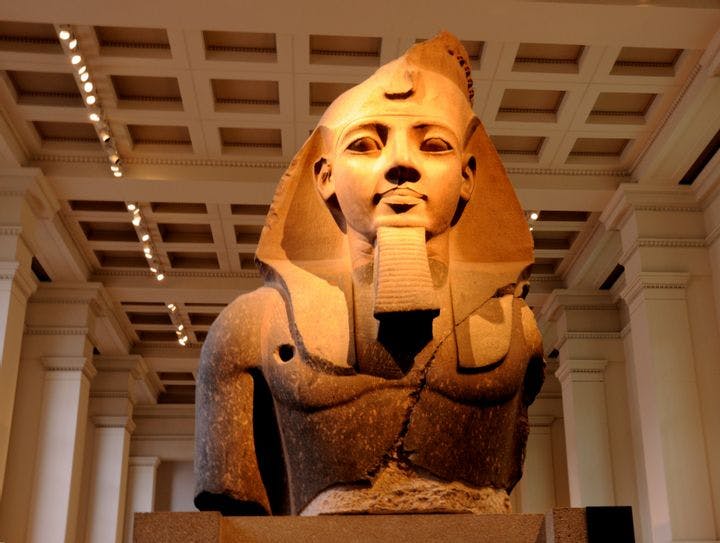Spring 2008
Art and Statecraft
– Christopher Merrill
Christopher Merrill appreciates the "intimate writings" of Greek diplomat George Seferis, whose Levant Journal offers "a portrait not only of critical moments in places that continue to make headlines, but also of a singularly talented writer."
The relationship between literature and politics is necessarily fraught. This is especially true for writers engaged in matters of state. If writers try to articulate questions central to the human condition, diplomats must provide answers. The responsibilities of these vocations almost inevitably conflict, for the writer’s commitment to truth may test the diplomat’s instructions. But a precious few have managed to excel in both spheres. The tradition of literary diplomats reached its zenith in the early 1960s, when three Nobel Prizes for Literature were awarded to writers who had also served as diplomats—Saint-John Perse of France, Ivo Andric of Yugoslavia, and George Seferis of Greece.
War is the ultimate test of diplomatic skills and literary vision. And World War II, which for political reasons marked the end of the diplomatic careers of Perse and Andric, is the starting point for A Levant Journal, Seferis’s account of his days and nights in Egypt with the Greek government in exile and then as ambassador to Lebanon, Syria, Jordan, Iraq, and Britain. Translated by Roderick Beaton, who published an acclaimed biography of Seferis, these selections from Seferis’s notebooks, from 1941–44 and 1953–56, offer a portrait not only of critical moments in places that continue to make headlines, but also of a singularly talented writer whose grasp of contemporary issues—the fallout from the 1948 Arab-Israeli War, for example, or the consequences of Cypriot independence—was informed by his historical sensibility. A Levant Journal is that rare book that will appeal to aesthetes and politicos alike.
Writing was how Seferis maintained a difficult balance in diplomatic circles. In one entry Seferis bitterly notes, “Whether the entire population of my country is wiped out, or only half of it, will now depend upon the idiocies of the British generals.” Elsewhere he confides that “seriousness and politics are two perfectly separate things.” Yet in the poems that emerge in these pages, often from observations of simple things like water lilies, Seferis yokes his artistic insight and long experience in the drawing rooms of power. “Whatever the hands of man take up with love is holy,” he notes. His writings, for example.
What counters his despair at the progress of the Second World War is his determination to record without sentimentality his impressions and encounters. Here is a delightful sketch of Churchill on a visit to Cairo in 1942:
In the ballroom, . . . hunched up like Rodin’s Thinker, except for his head that was watching and following everything, sat Churchill. He wore mauve dungarees; held in his hand, like a stubby pencil, was a long cigar. With all this crowd around him, he looked somehow smaller, as though at the far end of an enormous lecture-theater. Then he spoke and came closer. At the end, when it was time for questions, some reporter wearing a fez asked him what he thought of Rommel.
“That is the way of generals,” he replied, “sometimes to advance, sometimes to retreat. Why, no one knows . . .”
A Levant Journal is also lined with departures, sometimes hastily arranged, and in the pages devoted to the poet’s ambassadorial duties, which required that he be constantly on the move, he exhibits a keen understanding of history’s changing course. As befits a man whose life was marked by exile—from his native Smyrna, when Greece and Turkey exchanged populations in 1923; from Athens during the German occupation, and again during the military junta that began in 1967—he had a better grasp than most of the consequences of the dislocations that would shape the region in which he served.
“Impossible to imagine the human capacity for making a mess of things,” he laments. But in these intimate writings, Seferis bears witness to our folly with such care and precision that we may begin to understand some of our own mad impulses. And if this is a liberating truth, it is of a piece with his life and work, which is why his funeral, in 1971, brought throngs of people into the streets of Athens, in defiance of the junta. They sang a forbidden song based on one of his poems, with the policemen looking on.
* * *
Christopher Merrill directs the International Writing Program at the University of Iowa, and is the author of Things of the Hidden God: Journey to the Holy Mountain, and Only the Nails Remain: Scenes from the Balkan Wars, among other books.
Reviewed: "A Levant Journal" by George Seferis, Translated and edited by Roderick Beaton, Ibis Editions, 2007.
Photo courtesy of Flickr/Reji
